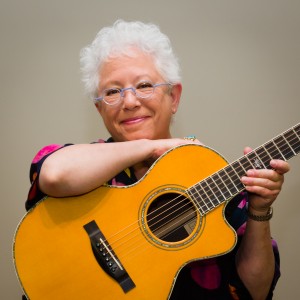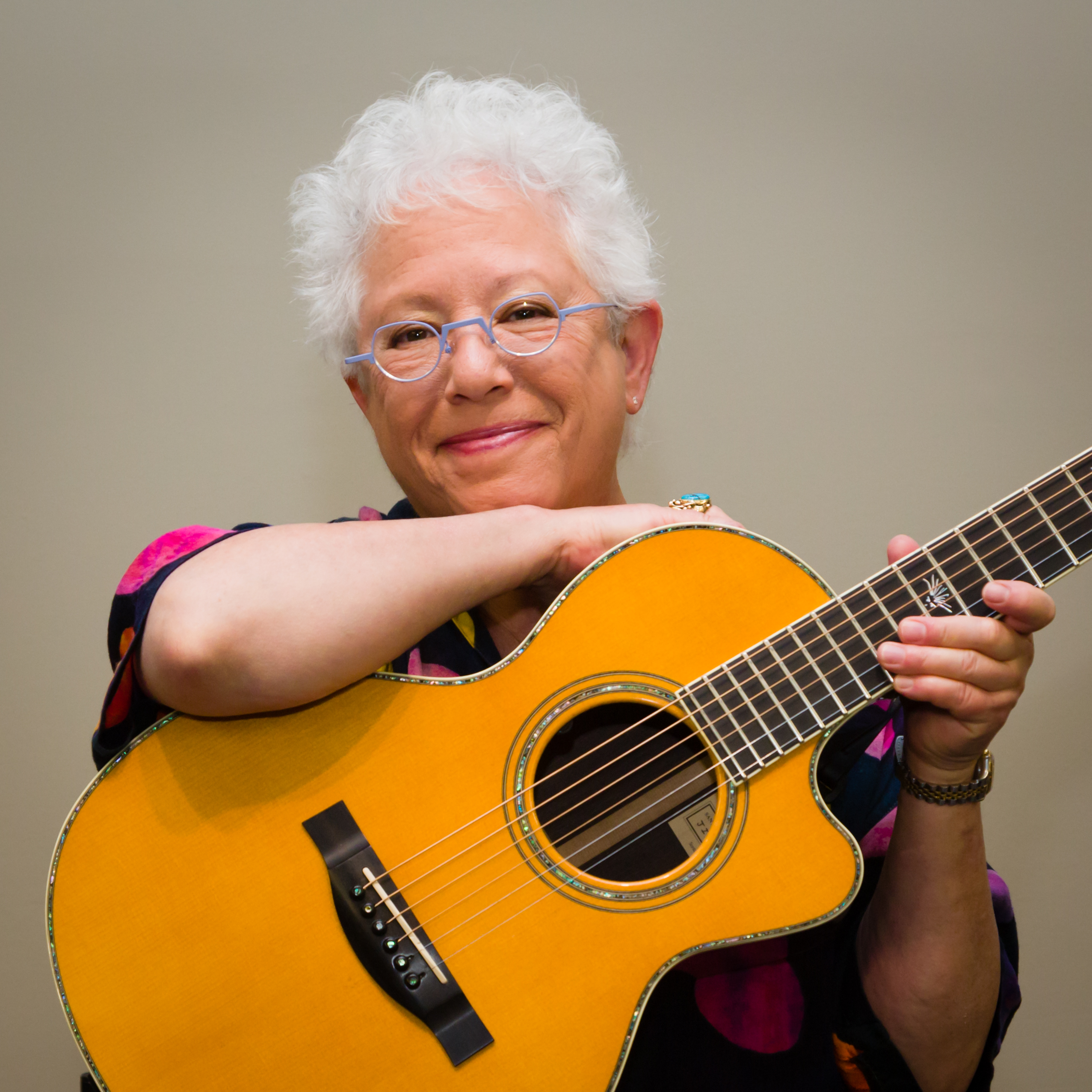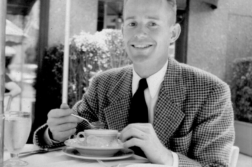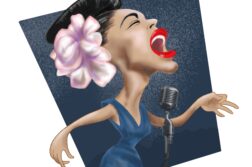IT WAS just about fifty years ago that singer–songwriter Janis Ian had her first hit, “Society’s Child” (1967). Nearly a decade later she released “At Seventeen” (1975), which became her signature song. Since then, she has had a multifaceted career as a recording and touring artist, and she is an accomplished writer of essays, science fiction, and an acclaimed autobiography.

Last fall, Ian produced an audiobook version of a queer literary classic, Patience and Sarah, by Alma Routsong, self-published in 1969 under the pen name Isabel Miller. The novel was a historical romance based on a true story of two lesbians in early 19th-century New England, a folk painter and a young woman from a poor farming family who fell unabashedly in love and forged a life together. The book was awarded the first Stonewall Award of the American Library Association in 1971.
For the audiobook, Ian invited actress Jean Smart (Designing Women) to join her in bringing the novel to life. Ian and Smart alternate reading chapters to echo the dual point-of-view of the narrative. The audiobook was nominated for a 2016 Grammy Award in the Best Spoken Word category. It was Janis Ian’s tenth Grammy nomination (in eight categories).
This interview was conducted by phone in January.
John Killacky: Congratulations on your tenth Grammy nomination for Patience and Sarah. What drew you to this material?
Janis Ian: I discovered it when I was about 20 or 21. I had just fallen in love with a woman for the first time. I had only seen books about gay people, which were very negative. I picked up this book called Patience and Sarah. First, it was historical fiction, which I love, but second, it was lovely, so I bought it and it became a perennial favorite. I would buy used copies when I saw them, because it kept going in and out of print. When Audible Studios asked what I wanted to do next, I really wanted to do Patience and Sarah.
JK: Having Emmy Award-winning Jean Smart read the part of the painter was brilliant. How did that come about?
JI: I thought it really important that the co-narrator not be gay. I wanted people to see it as not only a gay novel. I wanted it to be seen as a classic historical novel as well. We went through a whole bunch of people. Jean came on board right after she read the novel. She said she loved it because it was erotic without being pornographic. I thought she gave Patience so much character.
JK: You’ve done a few audiobooks, including your autobiography, Society’s Child, which won a Grammy for Best Spoken Word in 2013. Why this interest in audiobooks?
JI: I wrote my autobiography and it was well-received. An old friend happened to hear me read at a local bookstore and said that this really needs to be an audiobook. It turned out I was good at it. It was like acting without all the other pressures. I thought Patience and Sarah was a really worthy project, and I wanted it to be heard. My hope is that it will wind up in the young adult section in libraries. I think it’s so important for gay kids to read about something that is a “normal” fictional setting. This is a dose of serious history and what it was like to be a woman then.
JK: Lincoln Center invited you to be part of its Great American Songwriters series in February. Will you be going back on the road this year?
JI: No. The kind of touring I have always done—which is to go out and stay out—is getting to be just too hard. It just doesn’t make sense to go out that way right now. I am going to be 65 this year. It’s a different kind of energy.
JK: Fifty years ago, at the age of fifteen, you recorded your first album and received your first Grammy nomination in the Folk Performance category. How has the music industry changed over five decades?
JI: It’s an industry now, not a business. So huge that it has become small, if that makes sense. When I was a kid with “Society’s Child,” there were 22 major record labels in the U.S. Now there are three, maybe four—and not all of them are based in the U.S.
JK: Could you have made it today, if you were once again fifteen?
JI: I think so, because I had the drive and the talent, and those are things you’re born with. Would it have been as spectacular? Probably not. I remember as a kid thinking, “If only they had a show with our music on it.” There were only two or three TV shows that would even consider a pop artist, let alone a folk or jazz musician. It’s so omnipresent now, it’s become so easy to make the music, easy to distribute music, both good and bad. There are something like 200,000 releases a year. It’s ridiculous.
JK: So many artists have covered your songs. Any favorites or any clunkers you want to talk about?
JI: Not unless I want to get my head handed to me. I will say that I think Celine Dion did an astonishingly good job with “At Seventeen.”
JK: When you married your wife Pat in Canada in 2003, you two became the first same-sex-couple wedding announcement in The New York Times. How difficult has it been to navigate your personal and public lives as an artist?
JI: Not terribly. We made a decision at the outset, when I came out in 1993 at the Triangle Ball, that we were not going to make it a press issue. We didn’t do a press release until after our wedding was all done, so it wouldn’t turn into a zoo. My work is my work, and being a public person is part of my work, but it is not part of being at home with Pat as my partner.
JK: You’re known to be very generous in your philanthropy, donating over $900,000 in scholarships for students returning to college. Your foundation is named after your mother Pearl. Why this focus in your giving?
JI: I think for a second-generation Jewish kid growing up, it was always understood that education was the key. It was the way up, the way out. My father was a chicken farmer and went to college on the GI Bill to become a teacher. My mother had always wanted to go to college, but there wasn’t enough money. When she was stricken with MS and it became clear that she couldn’t work anymore, my brother and I became desperate to find something to sustain her will to live. We found Goddard College, which at the time was the only school allowing nonresident older students. Attending Goddard gave her a sense of future for herself that the multiple sclerosis was robbing from her.
When she died, I wanted to honor her, and Pat suggested that we endow a scholarship at Goddard. When Pat and I look at the number, $909,000, it is a staggering amount of money. We’re very much aware of that, but we’re also aware that part of being financially successful is giving back. We figure we have about thirty graduates now. That’s a lot of lives changed.
JK: You hinted on your website that you’re talking to a major label about reissuing your catalog.
JI: We’re hoping to do a complete re-release of everything, or at least everything that I own and control—hoping to do a special vinyl edition for audiophiles of Between the Lines; hoping to get it back into circulation. It’s only been me dealing with distribution and all of that. I would like to get out from under that.
JK: Can fans expect a new record?
JI: There are new songs, but not enough of them that I want to make a record. I figure my next record will be my last, in all seriousness, and I want it to be the best thing I’ve ever done. That means the songs have to be unimpeachable, and that’s a pretty high goal. My real goal this year is to clear out the business stuff that takes me away from the creative stuff. The older you get, the more luggage you’ve got.
John R. Killacky is executive director of Flynn Center for the Performing Arts in Burlington, VT.






